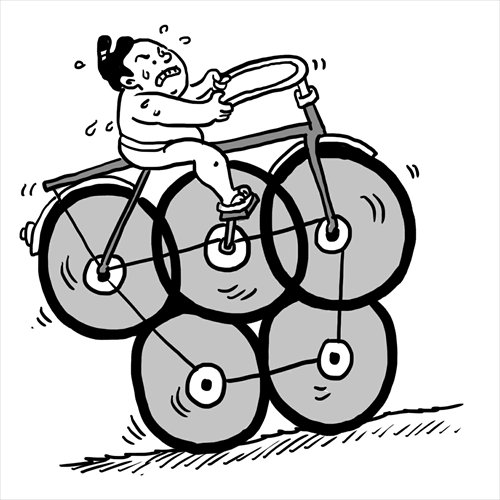Japanese Olympics fever may be misplaced

Illustration: Liu Rui/GT
Tokyo will host the 2020 Summer Olympics for the second time after 56 years. The decision by the International Olympic Committee has immersed the city's residents in boundless joy. Apart from developing a sudden enthusiasm for sports, they are also expecting various positive effects the Olympic Games may yield for a Japan still struggling amid a stagnant economy.
But there has been discontent from the people of Fukushima who slammed Prime Minister Shinzo Abe for focusing too much on the bid and preparations for the Olympics instead of the awful situation in the nuclear disaster-stricken area, especially since the contaminated water leakage into the Pacific Ocean has yet to be properly contained.
Save for the fury expressed by residents in the northeast coastal region, there are few voices doubting the potential benefits brought by the Games.
Hosting the Olympics is generally believed to bring about positive effects and in particular spur economic development. It needs an enormous amount of investment in infrastructure including all sorts of sports venues as well as operational expenses, several times more than the proceeds gained from television relay and commercial sponsorship. The direct investment will create a good deal of indirect demand, thus stimulating the economic system as a whole and creating more jobs.
However, this view does not hold water, because the investment in organizing the Olympics is, in the final analysis, an input that cannot simply be translated into output.
Part of the investment is sponsored by enterprises and the rest comes from the fiscal budget of the government of the host country, so the Olympic Games, like other public services including unemployment insurance and investment in education, actually reallocates social resources instead of creating wealth.
While there is no denying that a wide spectrum of construction projects make an immense demand for building materials a necessity and provide jobs for construction workers, spending in other areas could have a similar impact. Beneficiaries of unemployment insurance will create demands for consumer goods that in turn bring jobs for goods providers. So it is high time to compare what kind of demands will bring about the most benign effects for the long-term social and economic development.
Besides roads, the host country usually invests in sports facilities, and whether these can be used for productive activities in the post-Olympics era remains in question. Some facilities will be abandoned while others have to be maintained by the government with continuous investment.
Tokyo has an advantage because it can make use of the utilities built for the 1964 Games. Despite this, the budget, with reconstruction expenses included, was calculated to reach $4.4 billion or more.
Holding the Olympics is also expected to boost the sightseeing industry. Though consumption by foreign spectators is net income for the host country, the negative impact of the Games on the tourist industry cannot afford to be ignored.
A certain number of visitors may not choose to come due to the rises in hotel fees and traffic congestion.
An investigation into the 1996 Atlantic Olympics showed that local restaurants and hotels witnessed a decline in their profits during the Games and there was also no obvious increase in investment in post-Olympics era brought by the rising reputation of the host city.
Therefore Tokyo, a world-class metropolis with a mature tourist industry, may face the same scenario or worse.
Abe's cabinet spared no effort to win the bid for the 2020 Olympics. Led by the right-wing nationalist, the government in the mire of heavy debt is trying its best to expand fiscal expenditure.
A report by Japan's Ministry of Finance shows that the country's budget will hit a historical high next year.
Whether Japan's domestic economy will get back on its feet remains to be seen, but there are few reasons to be optimistic.
The author is a scholar living in Japan. opinion@globaltimes.com.cn